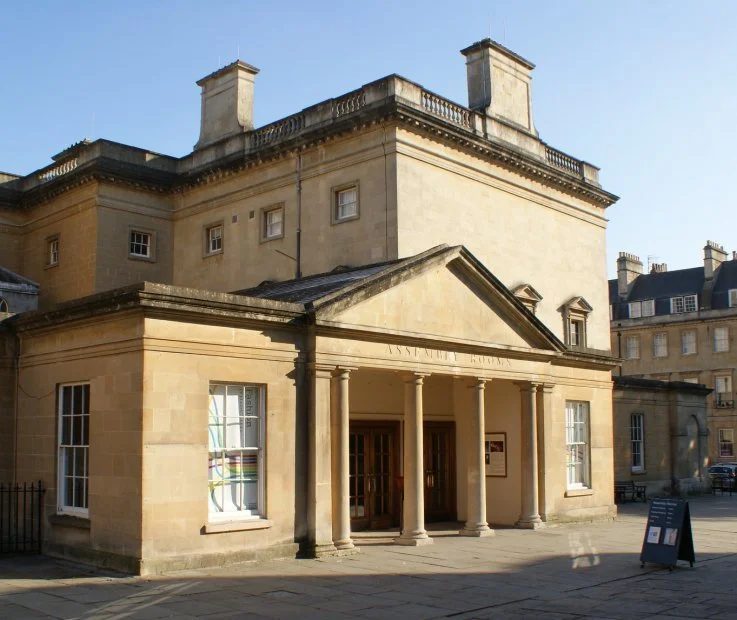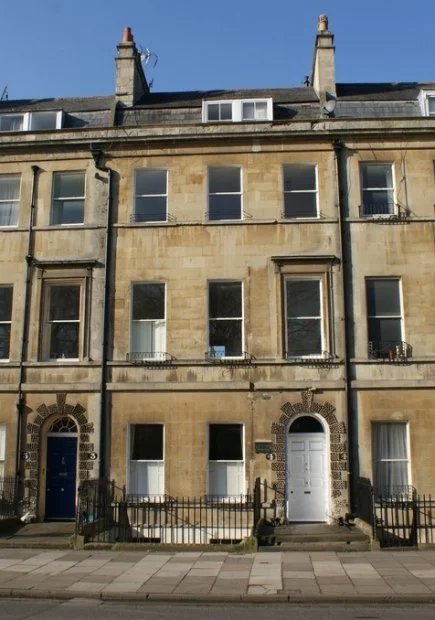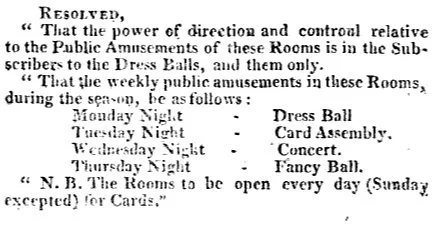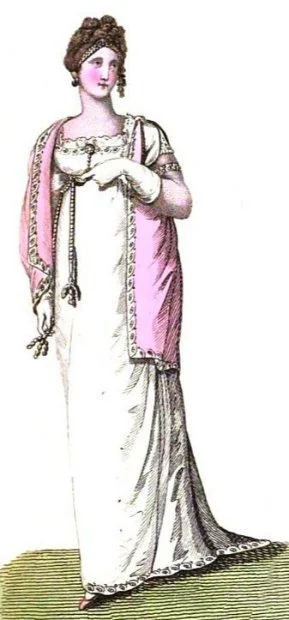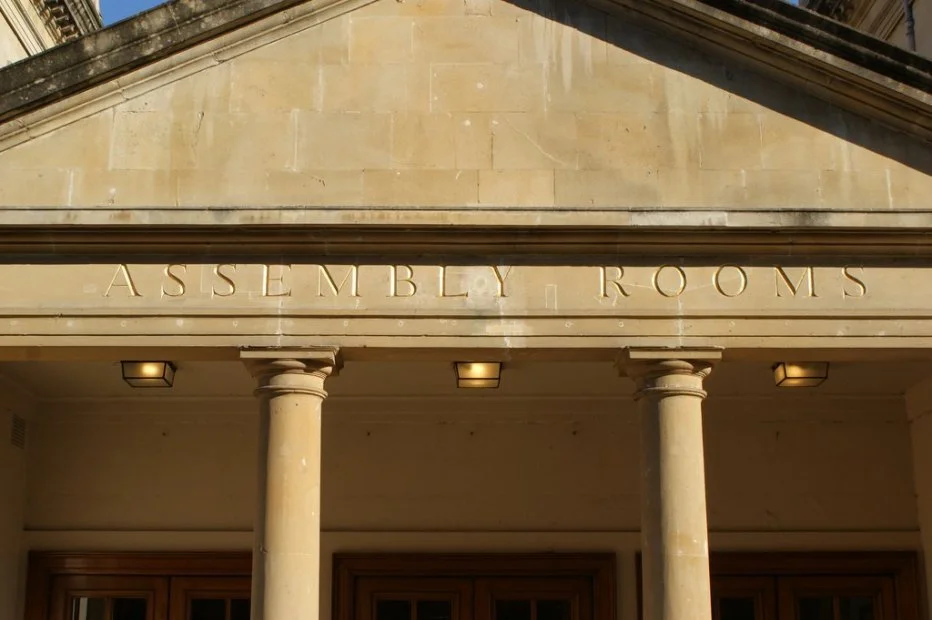The Bath Assembly Rooms in Jane Austen’s novels
The Upper Rooms, Bath (2012)
By the time of the Regency, Bath was no longer the fashionable resort that it had once been. The rise in popularity of sea bathing had sent the ton flocking to towns such as Weymouth and Brighton, leaving Bath to the invalids and those who could not afford to keep up a fashionable lifestyle in London.
Bath society was served by two sets of Assembly Rooms, the Lower Rooms and the New or Upper Rooms.
Jane Austen lived in Bath from 1801 to 1805, and she used her personal experience to bring the city to life in her books. Two of her novels are partly set in Bath: Persuasion and Northanger Abbey.
4, Sydney Place, Bath, where Jane Austen lived 1801-5
Persuasion
The Assembly Rooms play a small but important part in Persuasion. They are the backdrop for a pivotal scene in the story. The heroine, Anne Elliot, is eager to visit the Rooms in the hope of meeting Captain Wentworth, but she is prevented by her father’s snobbish attitude.
The theatre or the rooms…were not fashionable enough for the Elliots, whose evening amusements were solely in the elegant stupidity of private parties, in which they were getting more and more engaged. 1
A concert in the Upper Rooms
However, Sir Walter and his elder daughter Elizabeth are eager to attend a concert at the Rooms in the company of their exalted relative, Lady Dalrymple.
It was a concert for the benefit of a person patronised by Lady Dalrymple. Of course they must attend. 1
The Tea Room, Assembly Rooms, Bath (2012) where concerts were held every Wednesday.
Although Jane Austen does not specifically say that the concert was being held in the Upper Rooms, as opposed to the Lower Rooms, it is clear that it was, because she mentions a room there, the Octagon Room, by name:
Sir Walter, his two daughters, and Mrs Clay, were the earliest of all their party at the rooms in the evening; and as Lady Dalrymple must be waited for, they took their station by one of the fires in the Octagon Room. 1
The Octagon Room, Assembly Rooms, Bath (2012)
The Concert Room referred to was the Tea Room, which was mainly used for concerts and refreshments. It is at this concert that Anne Elliot begins to hope that her affection for Captain Wentworth is returned when that gentleman storms off in a jealous rage.
Northanger Abbey
In Northanger Abbey, the heroine, Catherine Morland, often visits both the Upper and Lower Rooms.
A crowd at the Upper Rooms
The Ballroom, Assembly Rooms, Bath (2012)
Catherine eagerly anticipates “the important evening” which was “to usher her into the Upper Rooms”. Unfortunately
...Mrs Allen was so long in dressing that they did not enter the ballroom till late. The season was full, the room crowded, and the two ladies squeezed in as well as they could. As for Mr Allen, he repaired directly to the card-room, and left them to enjoy a mob by themselves. 2
Mrs Allen proceeds to spend the whole evening bemoaning her lack of acquaintances in Bath which prevent her from being able to supply Catherine with a partner. However, Catherine’s vanity is satisfied by overhearing two gentlemen pronouncing her “to be a pretty girl”. 2
An important introduction at the Lower Rooms
Catherine is more successful when she visits the Lower Rooms:
They made their appearance in the Lower Rooms; and here fortune was more favourable to our heroine. The master of the ceremonies introduced to her a very gentlemanlike young man as a partner; his name was Tilney. 2
Catherine’s conversation with Mr Tilney reveals that she visited the Upper Rooms on Monday, the theatre on Tuesday and a concert on Wednesday. The programme of events at the Upper Rooms indicates that it was a dress ball that she attended at the Upper Rooms and that the concert was also held there.
The entertainments at the Upper Rooms from A Guide to all the Watering and Sea-Bathing Places by J Feltham (1815)
What Catherine wore
Mr Tilney teases Catherine about what she will write in her journal and gives us a description of what Catherine wore to the Lower Rooms:
‘Yes, I know exactly what you will say: Friday, went to the Lower Rooms; wore my sprigged muslin robe with blue trimmings—plain black shoes—appeared to much advantage; but was strangely harassed by a queer, half-witted man, who would make me dance with him, and distressed me by his nonsense.’ 2
Ball dress from La Belle Assemblée (1807)
The Master of Ceremonies
Mr Tilney proceeds to tell Catherine what he would like her to write in her journal, and in so doing, mentions by name the Master of Ceremonies:
‘I danced with a very agreeable young man, introduced by Mr King; had a great deal of conversation with him—seems a most extraordinary genius—hope I may know more of him.’ 2
James King, Master of Ceremonies at the Lower Rooms until 1805 from The New Bath Guide (1799)
At first glance, it seems as if Jane Austen has got her facts wrong. When Northanger Abbey was published in 1818, Mr King had long since ceased to be the Master of Ceremonies at the Lower Rooms. He was promoted to the Upper Rooms in 1805.
However, Jane Austen wrote Northanger Abbey in the late 1790s and first submitted it for publication in 1803, at which time Mr King was still presiding over the Lower Rooms.
Dancing partners
A conversation between Isabella Thorpe and Catherine’s brother James brings up the question of whether it is necessary to change dancing partners at the Upper Rooms. It is, of course, laughable that Jane Austen puts the words of propriety into the flirtatious Isabella’s mouth:
‘How can you be so teasing; only conceive, my dear Catherine, what your brother wants me to do. He wants me to dance with him again, though I tell him that it is a most improper thing, and entirely against the rules. It would make us the talk of the place, if we were not to change partners.’
‘Upon my honour,’ said James, ‘in these public assemblies, it is as often done as not.’ 2
Entrance to the Assembly Rooms, Bath (2012)
Read more about the Assembly Rooms here:
Rachel Knowles writes faith-based Regency romance and historical non-fiction. She has been sharing her research on this blog since 2011. Rachel lives in the beautiful Georgian seaside town of Weymouth, Dorset, on the south coast of England, with her husband, Andrew, who co-writes this blog.
If you have enjoyed this blog and want to encourage us and help us to keep making our research freely available, please buy us a virtual cup of coffee by clicking the button below.
Notes
(1) Persuasion by Jane Austen (1818).
(2) Northanger Abbey by Jane Austen (1818).
Sources used include:
Austen, Jane, Northanger Abbey and Persuasion (1818)
Crutwell, R (pub), The New Bath Guide (1799)
Feltham, John, A Guide to all the Watering and Sea-Bathing Places (1815)
Garnett, Oliver and Dunlop, Patricia, The Assembly Rooms, Bath, the Authorised Guide (c2011)

